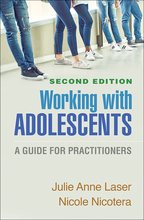Working with Adolescents
Second Edition
A Guide for Practitioners
Julie Anne Laser and Nicole Nicotera
New to This Edition
- Incorporates current research on brain development, resilience, gender diversity, mental health care, and more.
- Chapters on new topics: the adolescent brain, trauma, and suicide and self-injury.
- Fully rewritten chapters on substance use, queer youth, justice-involved youth, and the joys of working with adolescents.
- Reflects the unique contexts and challenges facing Generation Z.
This title is part of the Clinical Practice with Children, Adolescents, and Families Series, edited by Nancy Boyd Webb.
“With a difficult subject, a wealth of impressive research, and case studies that are heart-wrenching, the authors manage to make this book readable. In addition to educating, the book reminds readers of the importance of adolescent work and the scope of the needs of teens who are just trying to find themselves.”
—Doody’s Review Service
“A highly readable book, helpful to novice and experienced professionals alike. This comprehensive volume addresses a broad range of issues that affect adolescents. It is chock-full of tips and clinical examples that portray adolescents within diverse cultural contexts. People working with teenagers will turn to this text again and again to help them understand the young people who come their way.”
—Lisa Aronson Fontes, PhD, Senior Lecturer II, University Without Walls, University of Massachusetts Amherst
“If you do therapy with adolescents, you have to understand their developmental landscape. You need to know what challenges to expect, what variations are typical, and what the influences are that determine each youth's trajectory. Laser and Nicotera have provided that roadmap for us. This second edition is a 'must read' for modern-day therapists who want to deliver treatment informed by science.”
—Guy S. Diamond, PhD, Director, Center for Family Intervention Science, Drexel University
“I used the first edition for a class on social work practice with adolescents, and found it a practical way to teach interventions. The second edition's increased focus on structural racism and discrimination and the trauma that ensues is timely and essential. Mental health professionals have an ethical duty to look beyond labels of individual pathology and take systemic injustice into consideration. This book can be used to train practitioners who work with adolescents in many settings, such as clinics, schools, and community organizations. Students will benefit from the numerous case studies, which illustrate not only challenges but also opportunities when working with adolescents.”
—Robin Deluca-Acconi, PhD, LCSW, Assistant Dean for Student Services and Clinical Assistant Professor, Stony Brook University School of Social Welfare
Table of Contents
I. Theoretical Framework
1. Benefits and Challenges in Clinical Work with Adolescents: An Overview 
2. The Push–Pull of Adolescent Development
3. The Adolescent Brain
4. Resilience in Adolescence
II. The Adolescent in Context
5. Internal Assets and Individual Attributes Associated with Healthy Adolescent Outcomes, Nicole Nicotera & Thomas Luster
6. The Family Environment and the Adolescent, Julie Anne Laser & Douglas Davies
7. The School Environment and the Adolescent
8. The Neighborhood Environment and the Adolescent
9. Media Influences and the Adolescent
10. Assessment and Intervention at Each Ecological Level: A Case Illustration, Julie Anne Laser, Nicole Nicotera, Thomas Luster, & Douglas Davies
III. Clinical Interventions to Support Adolescents
11. Trauma from an Ecological Perspective
12. Substance Use and Dependence
13. Working with Queer Youth
14. Mental Health Issues in Adolescence: Anxiety and Depression
15. Suicidal Thoughts and Related Behaviors, Stacey Freedenthal
16. Sexually Active Teens, Rebecca Bolden, Shannon Sainer, & Julie Anne Laser
17. Juvenile Justice Involved Youth
18. The Joys of Working with Adolescents
References
Index
About the Authors
Julie Anne Laser, PhD, MSW, LCSW, is Professor in the Graduate School of Social Work at the University of Denver. She is a cofounder and Executive Director of Colorado Clinical Therapy. Dr. Laser has clinical and research expertise in experiential therapy, working with military families, posttraumatic stress disorder and trauma-focused therapy, parenting issues, child and adolescent healthy development, couple therapy, adolescent substance abuse, working with human trafficking victims/survivors, well-being and resilience throughout the life cycle, and school social work. She has worked as a clinician in the United States, in both rural and urban settings; Mexico; Peru; Italy; and Bolivia.Nicole Nicotera, PhD, LICSW, is Professor in the Graduate School of Social Work at the University of Denver. Dr. Nicotera has a passion for teaching mindfulness and meditation techniques to support stress reduction and well-being among helping professionals. Her research interests include examining innovative ways to promote health across the lifespan and mindfulness practices as a pathway to well-being. She also conducts research on youth civic engagement and on issues of unearned privilege and oppression in social work practice, education, and research. As a clinical social worker, Dr. Nicotera worked with children, youth, and families in a community mental health center, and also has extensive school social work experience.
Contributors
Rebecca Bolden, MSW, Colorado Department of Human ServicesDouglas Davies, PhD, MSW, (deceased)School of Social Work, University of Michigan
Stacey Freedenthal, PhD, MSW, LCSW, Graduate School of Social Work, University of Denver
Thomas Luster, PhD, (deceased), Department of Family and Child Ecology, Michigan State University.
Shannon Sainer, MSW, MS, Director of Impact and Learning, National Service Office of Nurse–Family Partnership (NFP)
Audience
Practitioners and students in social work, clinical child/adolescent and school psychology, psychiatry, counseling, and nursing.Course Use
Serves as a text in undergraduate- and graduate-level courses such as Social Work Practice with Adolescents, Human Behavior and the Social Environment, Counseling Adolescents, and Adolescent Development.Previous editions published by Guilford:
First Edition, © 2011
ISBN: 9781609180355
New to this edition:
- Incorporates current research on brain development, resilience, gender diversity, mental health care, and more.
- Chapters on new topics: the adolescent brain, trauma, and suicide and self-injury.
- Fully rewritten chapters on substance use, queer youth, justice-involved youth, and the joys of working with adolescents.
- Reflects the unique contexts and challenges facing Generation Z.
